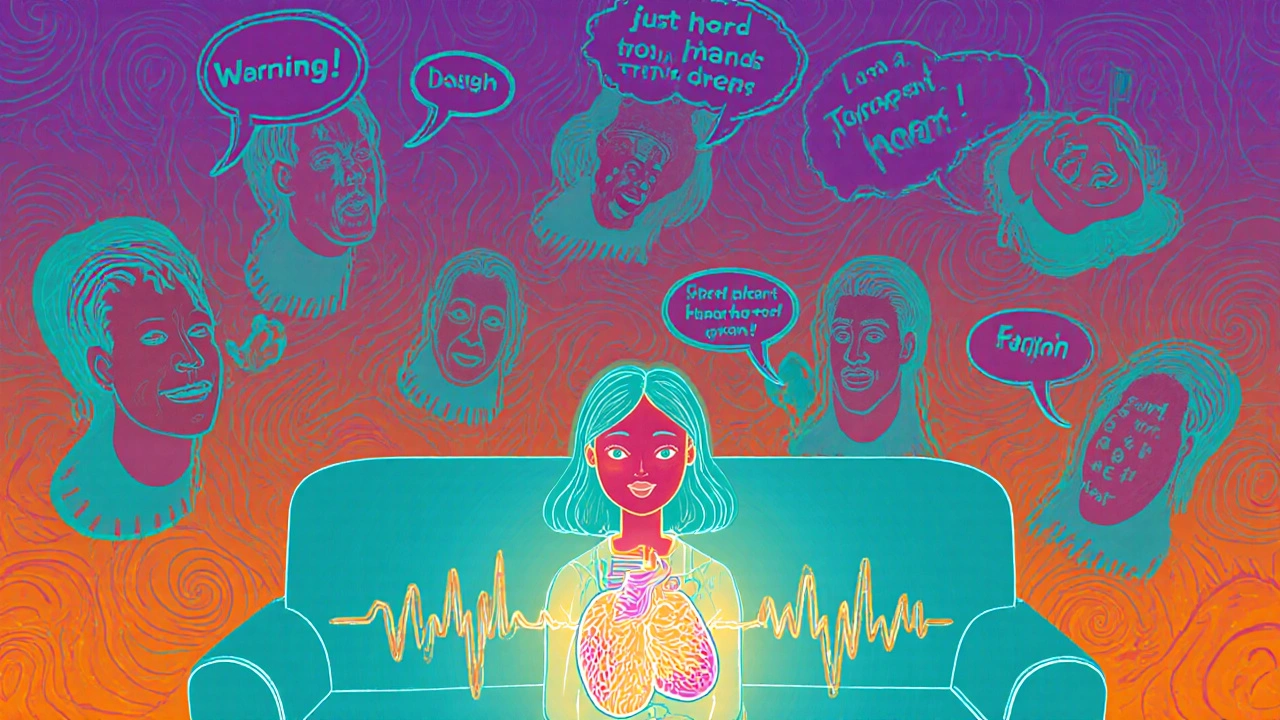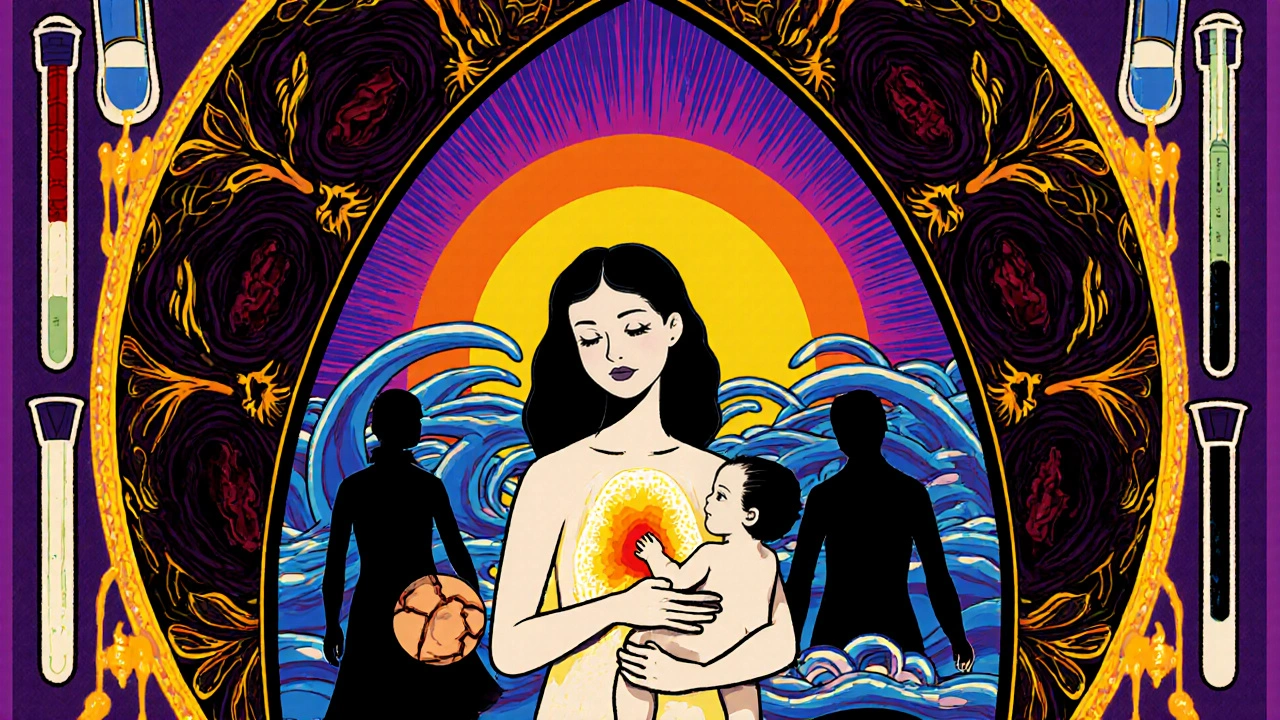What Exactly Is Postpartum Thyroiditis?
Postpartum thyroiditis is a temporary thyroid problem that happens after giving birth, a miscarriage, or an abortion. It’s not caused by an infection or a mistake - it’s your immune system going into overdrive after pregnancy. During pregnancy, your body suppresses some immune activity to protect the baby. After delivery, that suppression lifts, and in some women, the immune system starts attacking the thyroid gland by mistake. This leads to inflammation, which first floods your body with too much thyroid hormone, then leaves you with too little.
It affects about 5 to 10% of new mothers. That’s more common than many doctors realize. Many women go months without a proper diagnosis because their symptoms - fatigue, mood swings, weight changes - are written off as "just being a new mom." But this isn’t normal exhaustion. This is your thyroid sending out distress signals.
The Two Phases: Hyperthyroid Then Hypothyroid
Postpartum thyroiditis doesn’t hit you all at once. It usually comes in two waves.
The first wave - hyperthyroid phase - hits between 1 and 4 months after birth. Your thyroid gets inflamed, and stored hormones leak out. You might feel like you’re buzzing: heart racing, hands shaking, sweating even when it’s cool, losing weight without trying, or struggling to sleep. About half of women don’t even notice these symptoms. They just think they’re too wired from lack of sleep.
Then, around 4 to 8 months postpartum, the second wave hits: hypothyroidism. The thyroid is now exhausted. It can’t make enough hormones anymore. This is when the real weight settles in - not just pounds, but a deep, crushing fatigue. You feel cold when everyone else is warm. Your skin turns dry. Your hair starts falling out in clumps. Brain fog sets in - you forget names, lose focus, can’t find the right words. Constipation becomes routine. Weight gain happens even if you’re eating less.
Not everyone goes through both phases. About 1 in 5 women skip the hyperthyroid part and go straight into hypothyroidism. A small number only have the hyperthyroid phase and recover on their own. But most experience the full cycle.
How Do You Know It’s Not Just Postpartum Depression?
This is the biggest trap. The symptoms of postpartum thyroiditis and postpartum depression overlap so much that doctors often miss it. Both cause fatigue, sadness, irritability, trouble sleeping, and brain fog. But there’s a difference.
Postpartum depression is mostly emotional - you feel hopeless, guilty, disconnected from your baby. Postpartum thyroiditis has physical signs too: your heart races, your hands tremble, you’re intolerant to heat or cold, your hair falls out, your voice gets hoarse. You might notice your fingers feel swollen or your nails become brittle.
Studies show that about 30% of women with thyroiditis are misdiagnosed with depression and put on antidepressants - even though their real issue is hormonal. One mom on Reddit said: "I was on Zoloft for six months. I felt worse. Then I got my TSH tested. My thyroid was off the charts. I cried when I found out it wasn’t in my head - it was in my thyroid."
That’s why testing matters. If you’re feeling off after birth, don’t just assume it’s stress. Ask for a simple blood test.
How Is It Diagnosed?
There’s no mystery here. It’s a blood test.
Your doctor should check:
- TSH - thyroid-stimulating hormone. Low in the hyperthyroid phase, high in the hypothyroid phase.
- Free T4 - the active thyroid hormone. High early, low later.
- TPO antibodies - thyroid peroxidase antibodies. If these are high, your immune system is definitely targeting your thyroid. Over 80% of women with postpartum thyroiditis test positive for them.
These tests are cheap, quick, and covered by most insurance. They take less than 10 minutes to draw. Results come back in a few days.
Doctors often wait too long to order them. The average time to diagnosis is over 5 months. That’s too long. If you’re 6 to 12 weeks postpartum and still feeling exhausted, achy, or emotionally off - ask for these tests. Don’t wait for symptoms to get worse.

Who’s at Risk?
Not everyone gets this. But certain factors make it much more likely:
- You have type 1 diabetes
- You’ve had postpartum thyroiditis before
- You have another autoimmune disease - like lupus, rheumatoid arthritis, or celiac
- You have high TPO antibodies before or during pregnancy
- You have a family history of thyroid disease
Women with type 1 diabetes have a 25 to 30% chance of developing it. If you’ve had it once, you have a 40% chance of getting it again with your next pregnancy.
Even if you don’t have any risk factors, you can still get it. That’s why awareness matters. You don’t need to be high-risk to need testing - you just need to feel off.
What Happens If You Don’t Treat It?
Here’s the good news: for most women, the thyroid heals itself. About 70 to 80% return to normal thyroid function within 12 to 18 months.
The bad news: 20 to 30% end up with permanent hypothyroidism. That means you’ll need to take a daily thyroid hormone pill - usually levothyroxine - for the rest of your life.
Why does this happen? Because the immune attack doesn’t just cause temporary damage. It destroys thyroid tissue. If enough cells are killed, your thyroid can’t recover. The longer you go untreated, the more damage accumulates.
Also, untreated hypothyroidism can affect breastfeeding. Some women report a drop in milk supply during the hypothyroid phase. It can also make it harder to lose baby weight and increase your risk of high cholesterol and heart problems down the road.
Treatment: What Works and What Doesn’t
There’s no cure - but there are smart ways to manage it.
During the hyperthyroid phase: Most women don’t need medication. Beta-blockers (like propranolol) can help if your heart is racing or you’re shaking badly. But you don’t need to take thyroid blockers or radioactive iodine - those are for Graves’ disease, not this. In fact, treating the hyperthyroid phase aggressively can make the hypothyroid phase worse.
During the hypothyroid phase: If your TSH is above 10 mIU/L or you have symptoms, you’ll likely be prescribed levothyroxine. This is a simple, safe pill. Most women feel better within weeks. If your TSH is only mildly high (between 4.5 and 10) and you have no symptoms, your doctor might just watch and wait.
Either way, you’ll need repeat blood tests every 6 to 8 weeks to adjust your dose. Once your thyroid stabilizes, you’ll test every 6 months for a year, then yearly after that.
Important: If you’re breastfeeding, levothyroxine is safe. Only tiny amounts pass into breast milk, and it won’t harm your baby. In fact, treating your thyroid helps your milk supply and your energy to care for your child.

What’s Changing in 2025?
Doctors are waking up. In 2023, the American Thyroid Association updated its guidelines to recommend TPO antibody testing for all pregnant women with type 1 diabetes. More hospitals are starting to screen high-risk women at 10 weeks postpartum.
Some clinics now use digital symptom trackers - you log your fatigue, mood, weight, and temperature daily. The system flags patterns that match thyroiditis before you even see a doctor.
Experts predict that by 2030, universal TSH testing at 6 and 12 weeks postpartum will become standard in the U.S. Right now, only 42% of OB-GYNs routinely test. But the cost savings are clear: every correctly diagnosed case saves about $2,300 by avoiding misdiagnosis, unnecessary antidepressants, and long-term complications.
What Should You Do Now?
If you gave birth in the last year and you’re still not feeling like yourself - get tested.
Don’t wait for your 6-week checkup. That’s too early. Don’t wait for your 12-month visit. That’s too late. Aim for 6 to 12 weeks postpartum. If you’re still struggling at 3 months, ask for blood work.
Bring this list to your doctor:
- TSH
- Free T4
- TPO antibodies
If your doctor says "it’s just stress," ask: "What if it’s not?" If they refuse, get a second opinion. Your thyroid matters. Your energy matters. Your ability to care for your baby matters.
And if you’ve been diagnosed - know this: you’re not alone. Thousands of women have walked this path. Most recover fully. Some need lifelong medication. Either way, you can feel like yourself again. You just need the right test at the right time.
Can You Prevent It?
You can’t stop your immune system from changing after pregnancy. But you can reduce your risk of long-term damage.
Here’s what helps:
- Get tested early if you’re high-risk
- Treat hypothyroidism promptly - don’t wait for symptoms to worsen
- Stay on your medication if you need it - don’t stop because you feel better
- Monitor your thyroid if you get pregnant again - recurrence is common
- Consider a vitamin D supplement - low levels are linked to worse autoimmune outcomes
There’s no magic diet or supplement that cures it. But catching it early? That’s the best prevention.


Brittany C 13.11.2025
Just had my TPO antibodies tested at 10 weeks postpartum after my second kid - turned out positive. My TSH was 12.8. I’d been told for months it was "just sleep deprivation." Turns out my brain fog wasn’t in my head - it was in my thyroid. Levothyroxine changed my life. I can now remember my kid’s teacher’s name again. 🙏
Sean Evans 13.11.2025
Ugh. Another "I’m so tired" post. Newsflash: being a mom is HARD. You think your thyroid is the problem? Maybe you just need to stop complaining and sleep when the baby sleeps. Also, why are we giving out medical advice like it’s a TikTok trend? 😒
Anjan Patel 13.11.2025
Bro, this is why India has the highest rate of thyroid issues in the world - no one gets tested until they’re collapsing! I had postpartum thyroiditis after my daughter and my doctor laughed when I asked for TSH. "You’re young, you’ll bounce back!" Three months later I was crying in the shower because I couldn’t lift my own baby. Don’t wait. Get tested. Now. 🔥
Scarlett Walker 13.11.2025
You’re not alone. I was diagnosed at 5 months - felt like I’d been walking through wet cement for half a year. Started levothyroxine and within two weeks I could breathe again. Seriously. I hugged my husband and cried because I remembered what it felt like to be me. You got this. ❤️
Hrudananda Rath 13.11.2025
It is, indeed, a matter of profound physiological significance. The postpartum immunological recalibration, while evolutionarily adaptive, manifests in a subset of parturient women as a dysregulated autoimmune response targeting the thyroid gland. The failure of primary care physicians to initiate serological screening constitutes a systemic dereliction of duty. One cannot, in good conscience, attribute fatigue to mere parental exhaustion in the presence of elevated TPO antibodies. This is not anecdotal; it is clinical.
Brian Bell 13.11.2025
My wife went through this after our son. We thought she was just depressed. She cried every night. Then she found this post. Got tested. TSH was 18. Started meds. Two weeks later she laughed for the first time in months. Thank you for writing this. Seriously. 🙌
Nathan Hsu 13.11.2025
Let me be clear: TSH, Free T4, TPO antibodies - these are non-negotiable. If your provider refuses to order them, you must escalate - immediately. Postpartum thyroiditis is not a "maybe," it’s a probability - especially if you have any autoimmune history. I’ve seen too many women suffer needlessly. Don’t be one of them. Test. Test. Test.
Ashley Durance 13.11.2025
Everyone’s so quick to blame the thyroid. What about vitamin D deficiency? Iron? Sleep apnea from snoring? You’re all just jumping on the thyroid bandwagon because it’s trendy. My cousin had all these symptoms and it was just low iron. Don’t overmedicalize normal postpartum adjustment.
Scott Saleska 13.11.2025
Hey, I just wanted to say - I read this and I’m so glad you mentioned breastfeeding. I was terrified to take levothyroxine because I thought it’d hurt my baby. Turns out it’s not only safe - it helps your milk. My pediatrician didn’t even know that. You just saved me from stopping nursing. Thank you.
Barry Sanders 13.11.2025
Thyroiditis? More like "I didn’t plan my life well enough."
Chris Ashley 13.11.2025
My OB didn’t test me until 8 months - I was already on antidepressants. When I finally got the test, my TSH was 27. I felt like a zombie. Now I take a pill every morning and I’m back. Don’t wait. Just ask.
kshitij pandey 13.11.2025
My sister had this after her twins. She thought she was failing as a mom. Then she found a local support group. Now she helps other moms get tested. You’re not broken. You’re just out of balance. And balance can be fixed. You’re stronger than you think.
Ryan Anderson 13.11.2025
As a nurse practitioner, I’ve seen this too many times. Women come in exhausted, tearful, convinced they’re failing. We run the labs - TSH sky-high, TPO positive. They’re given antidepressants. They’re told to "sleep more." We’re missing the boat. We need routine postpartum thyroid screening. It’s cheap. It’s easy. It’s life-changing. Let’s make it standard.